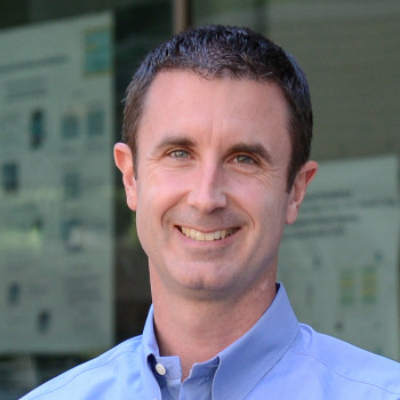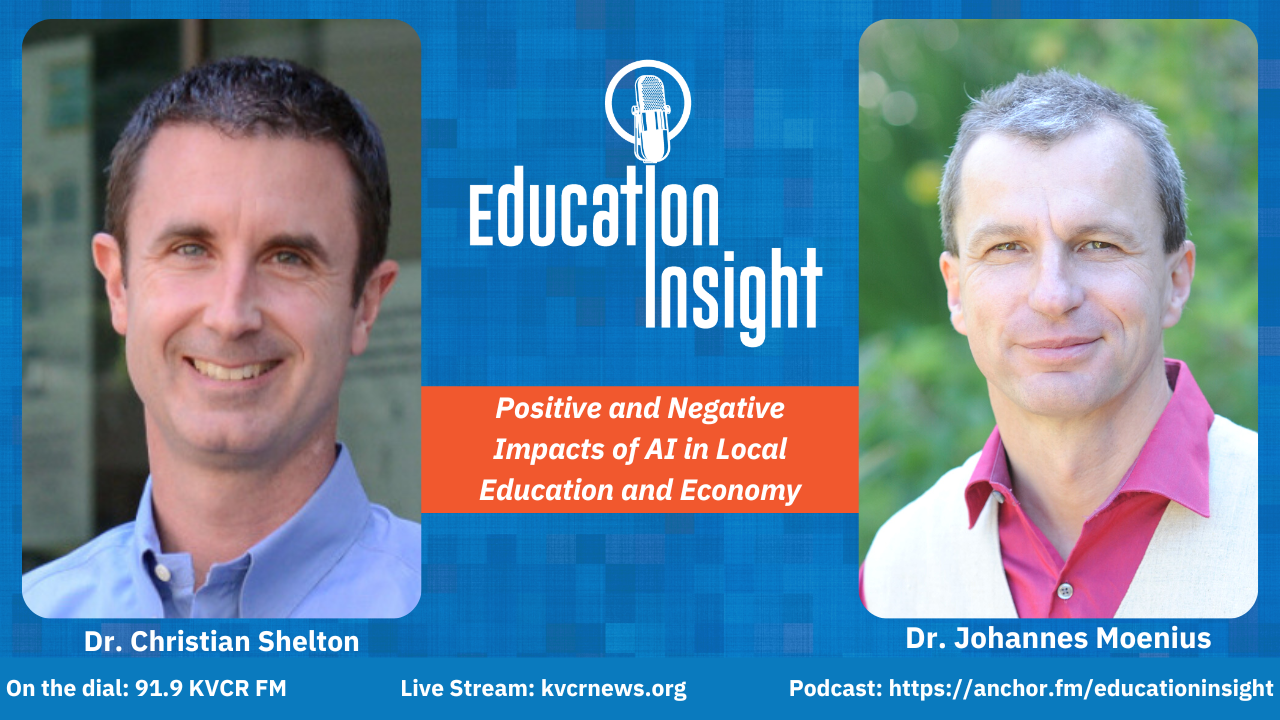
About This Episode
Season 3. Episode 3.
Artificial Intelligence has landed in the Inland Empire; allowing high school students to explore Egypt or China in virtual reality. It is helping pre-med students learn surgery with overlay vision that shows them where to make incisions and it’s making local logistic hubs more efficient. But two top experts in Inland economics and education are warning that it comes with a price. Instructors at all grade levels worry that chat gpt is actually completing your child’s school report, and Amazon is talking about creating “dark warehouses,” where all employees are let go, robotic devices take over the heavy lifting and they can save even more by turning off all of the lights. Are we prepared for all of this?
On today’s Education Insight, we focus on nothing but A.I. and our region. This story is one where local politicians and educators are working to save the future and our jobs by getting in front of Artificial Intelligence. Dr. Johannes Moenius, from the University of Redlands, is an internationally respected expert on global economics and technology who has focused much of his work and teachings on the Inland Empire. Dr. Christian Shelton; A faculty member in the Computer Science & Engineering department at the University of California Riverside, and Author or co-author of over 65 scholarly works on Artificial Intelligence dating back to 2006. He is the lead contributor and member of R-Lair; a Riverside California lab of scholars all dedicated to research on artificial intelligence. I hope you’ll join us for the next Education Insight when we explore: A.I. in the I.E.
Featured Guests
Dr. Christian Shelton
Professor, Computer Science & Engineering, UCR.
Biography
Dr. Shelton is a Professor of Computer Science at the University of California at Riverside and a member of UCR’s Data Science Center. He has been on the faculty since 2003. His research interests are in statistical approaches in artificial intelligence, with a focus on machine learning and dynamic systems. He has applied his work to areas ranging from astronomy to sociology to medical informatics.
Dr. Shelton received his B.S. in Computer Science from Stanford University in 1996. He then obtained his Ph.D. from MIT in 2001 and returned to Stanford from 2001 to 2003 as a post-doctoral scholar. He spent six months in 2003 and 2004 as a visiting faculty member at Intel Research and the 2012-13 academic year as a visiting researcher at Children’s Hospital Los Angeles. He has been the Managing Editor of the Journal of Machine Learning Research and on the Editorial Board of the Journal of Artificial Intelligence Research; he currently serves on the Editorial Board for the Journal of Machine Learning Research.
Dr. Shelton is a member of Tau Beta Pi (the national engineering honor society) and Phi Beta Kappa (the national liberal arts and sciences honor society). He received the Young Investigator Award from the Air Force Office of Scientific Research and was a member of DARPA’s Computer Science Study Group.
Dr. Johannes Moenius
Professor, William R. and S. Sue Johnson Endowed Chair of Spatial Economic Analysis and Regional Planning School of Business & Society
Biography
Johannes Moenius teaches global business at the University of Redlands. He is the founding director of the Institute for Spatial Economic Analysis (ISEA) and holds the William R. and S. Sue Johnson Endowed Chair of Spatial Economic Analysis and Regional Planning. Previously, he taught at the Kellogg School of Management and was a visiting scholar at Tokyo University. His research appeared, amongst others, in The Review of Economics and Statistics, Japan and the World Economy, and the International Journal of Industrial Organization. His recent work on automation and the workforce has been covered by the Atlantic, PBS Newshour, NPR, FastCompany, Business Insider, the Washington Post and many other news media worldwide. He has presented his work in more than 200 talks at universities, conferences, and government institutions.
Interview Highlights
3:54 – Dr. Shelton describes some of the ways AI is already being used today
13:11 – Dr. Shelton is asked if we should be rethinking education in general so our students are properly prepared for job security
16:35 – Dr. Shelton shares what he finds particularly promising as far as the uses of AI in education
18:15 – Dr. Shelton reflects on the ultimate impact of AI on our region in the next 5 years
20:40 – Dr. Shelton shares a message to local legislators about what they should be doing to assist educators and industry to help keep the IE economically productive
22:40 – Dr. Shelton explains why he believes our area will be able to adapt to a large influx of AI
26:42 – Dr. Moenius describes what changes will the Inland Empire face as more Artificial Intelligence arrives
32:08 – Dr. Moenius talks about what schools need to be teaching right now to help prepare students for the future
37:05 – Dr. Moenius gives insight into whether or not the new jobs that might use A.I. are going to require workers to upgrade their skills and get a college degree
42:56 – Dr. Moenius explains what local legislators need to be working on right now
46:45 – Dr. Moenius shares what jobs are likely to be affected when AI inevitably makes its way into most industries
View our podcast page for more stories like this: https://inlandempiregia.org/gia-podcasts/
Education Insight tells the story of education in the Inland Empire through the diverse voices of those in and around the regional education community. The show is produced by Growing Inland Achievement, a collective impact organization in the Inland Empire with a mission to increase economic prosperity in the region by increasing educational attainment. Hosted by 30-year broadcast veteran Lacey Kendall, monthly shows explore topics ranging from education challenges and shortcomings to innovations and groundbreaking ideas that are driving student success.



